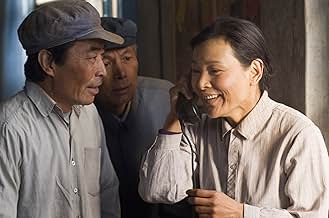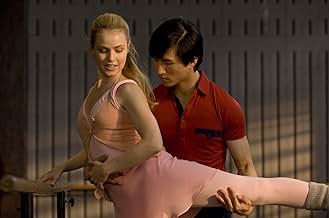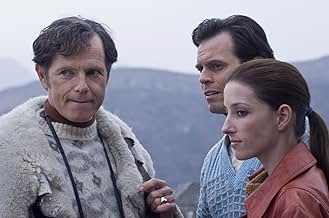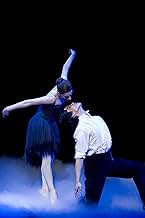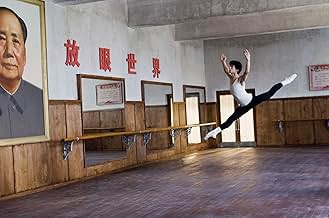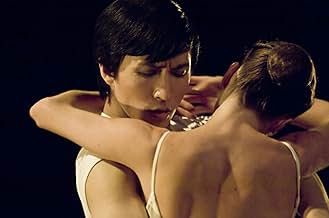IMDb RATING
7.3/10
8.5K
YOUR RATING
In Maoist China, a boy is taken from his family and trained to become a dancer, but everything he knows is challenged when he is chosen to attend a ballet summer school in Houston, Texas.In Maoist China, a boy is taken from his family and trained to become a dancer, but everything he knows is challenged when he is chosen to attend a ballet summer school in Houston, Texas.In Maoist China, a boy is taken from his family and trained to become a dancer, but everything he knows is challenged when he is chosen to attend a ballet summer school in Houston, Texas.
- Awards
- 7 wins & 20 nominations total
Christopher Kirby
- Mason
- (as Chris Kirby)
- Director
- Writers
- All cast & crew
- Production, box office & more at IMDbPro
Featured reviews
Bruce Beresford is one veteran Australian director who can produce popular films, and this one is definitely a crowd-pleaser, at least for the crowd that likes to watch dance. The story itself (naïve young dancer from totalitarian regime defects to the freedom of the West) is pretty hackneyed but is framed by some exquisite dancing scenes. My former Red Guard colleague "Robin" thought that the protagonist Li Cunxin was a bit of a goose, for, given his extraordinary talent, if he had gone back to China he would have reached the top of the dance establishment. Instead, seduced by the shopping malls and high rise of Houston as well as by a young American dancer, and outraged when he discovers the Party has lied to him about America, he defects, causing a minor diplomatic incident and cutting himself off for the time being at least from his family. Still, he was only 18 at the time.
The two actors portraying Li, Chengwu Gao as a boy and Chi Cao as an 18 year old, do excellent work, given that neither is a professional. In fact all the Chinese actors were terrific. The American / Australian support cast was OK (Jack Thomson reprising his good ole legal boy act, Kyle Maclachlan playing a straight role), though I found Bruce Greenwood as the Houston Dance Company director Ben Stevenson mildly irritating. One does see his point, however, about most of the Chinese dancers being athletes rather than artists. There were some sloppy aspects. Some of the Houston scenes were filmed in Balmain, Sydney, green street signs and all, which by no stretch of the imagination looks anything like anywhere in Houston. Yet Beresford filmed in Houston, and went to considerable trouble to film in China. The Qintao village scenes are beautifully composed and the very last scene shows how Beresford must have convinced suspicious local party officials that he was making a movie they could approve of. I guess he didn't show them the scenes with the Madam Mao–like character chucking her weight about.
It's not mentioned in the film, but it's well known that when Li's dance career came to an end he re-trained as a stockbroker, an unlikely "happy ever after" scenario. He now lives in Melbourne. Beresford and Jan Sardi based the script on Li's own best-selling memoir and there's no doubt they have added something, if only some great ballet scenes – the extract from Stravinsky's "Firebird was fabulous.
The two actors portraying Li, Chengwu Gao as a boy and Chi Cao as an 18 year old, do excellent work, given that neither is a professional. In fact all the Chinese actors were terrific. The American / Australian support cast was OK (Jack Thomson reprising his good ole legal boy act, Kyle Maclachlan playing a straight role), though I found Bruce Greenwood as the Houston Dance Company director Ben Stevenson mildly irritating. One does see his point, however, about most of the Chinese dancers being athletes rather than artists. There were some sloppy aspects. Some of the Houston scenes were filmed in Balmain, Sydney, green street signs and all, which by no stretch of the imagination looks anything like anywhere in Houston. Yet Beresford filmed in Houston, and went to considerable trouble to film in China. The Qintao village scenes are beautifully composed and the very last scene shows how Beresford must have convinced suspicious local party officials that he was making a movie they could approve of. I guess he didn't show them the scenes with the Madam Mao–like character chucking her weight about.
It's not mentioned in the film, but it's well known that when Li's dance career came to an end he re-trained as a stockbroker, an unlikely "happy ever after" scenario. He now lives in Melbourne. Beresford and Jan Sardi based the script on Li's own best-selling memoir and there's no doubt they have added something, if only some great ballet scenes – the extract from Stravinsky's "Firebird was fabulous.
Mao's last Dancer tells the true story of Chinese ballet dancer Li Cunxin who grew up in rural poverty in Mao's communist before being given the opportunity to dance in the West in the early 80s. Li is forced to examine his conscience as he must choose between his career, family, culture, politics and love whilst having to make heart-wrenching decisions of what he must choose to sacrifice and what he must choose to save.
Li Cunxin is played magnificently by Chi Cao (as an adult) as well as Chengwu Guo (as a teenager). Chi Cao, a highly recognised ballerino in his own right, must receive the bulk of the accolades for what is truly a seamless breakthrough performance by a first time actor. The rest of the cast are also fantastic including Bruce Greenwood who plays the difficult and complex part of a slightly camp Ballet Director who must confront his own values.
Kyle MacLachlan ("Sex and the City") takes a relatively brief but delightfully forceful turn as a Houston lawyer and Australians will delight in the cameo by the ever wonderful Jack Thompson.
As an Australian production I was extraordinarily proud. Bruce Beresford has produced arguably his finest picture to date (and yes, I've seen "Driving Miss Daisy") as the pacing, musical score, use of ballet on camera and story structure were all pitch perfect. The film jumps around between 80s USA and Li's Chinese upbringing at the beginning before settling into a groove during the middle and end. And just when the film could be in danger of straining it's audience Beresford delivers moments of levity and humour that remind us of the characters' humanity.
The backdrop of politics against which the film plays is neither ignored nor focused on. Had it gone one way or the other, the film wouldn't have worked nearly so well but Beresford dealt with this delicate theme with such craftsmanship that it never becomes an issue for the audience.
Jan Sardi (who also wrote Shine and the Notebook) has also produced a highly commendable script for what must have been a daunting project - given the success of the book the movie is based on.
At 132 minutes, the film is long and this can be felt slightly in the middle. However, the fault is only minor and I defy any viewer to watch this without being moved by Li's story.
Many who have read Li's memoirs (as I have) will be anxious to know whether the movie does the book justice. I'm overjoyed to say that it does. I openly wept several times in the film as did most of the audience members around me. There were a few subplots and parts of the novel left out but I found that, unusually, this didn't bother me as much as it normally does with movies based on true stories.
This is because the film told the essence of Li's story extraordinarily well in this irresistibly moving telling of one man's struggle as he's caught between two cultures at a time of when they were pushing against each other.
This year's Slumdog Millionaire upstart is Mao's Last Dancer.
Li Cunxin is played magnificently by Chi Cao (as an adult) as well as Chengwu Guo (as a teenager). Chi Cao, a highly recognised ballerino in his own right, must receive the bulk of the accolades for what is truly a seamless breakthrough performance by a first time actor. The rest of the cast are also fantastic including Bruce Greenwood who plays the difficult and complex part of a slightly camp Ballet Director who must confront his own values.
Kyle MacLachlan ("Sex and the City") takes a relatively brief but delightfully forceful turn as a Houston lawyer and Australians will delight in the cameo by the ever wonderful Jack Thompson.
As an Australian production I was extraordinarily proud. Bruce Beresford has produced arguably his finest picture to date (and yes, I've seen "Driving Miss Daisy") as the pacing, musical score, use of ballet on camera and story structure were all pitch perfect. The film jumps around between 80s USA and Li's Chinese upbringing at the beginning before settling into a groove during the middle and end. And just when the film could be in danger of straining it's audience Beresford delivers moments of levity and humour that remind us of the characters' humanity.
The backdrop of politics against which the film plays is neither ignored nor focused on. Had it gone one way or the other, the film wouldn't have worked nearly so well but Beresford dealt with this delicate theme with such craftsmanship that it never becomes an issue for the audience.
Jan Sardi (who also wrote Shine and the Notebook) has also produced a highly commendable script for what must have been a daunting project - given the success of the book the movie is based on.
At 132 minutes, the film is long and this can be felt slightly in the middle. However, the fault is only minor and I defy any viewer to watch this without being moved by Li's story.
Many who have read Li's memoirs (as I have) will be anxious to know whether the movie does the book justice. I'm overjoyed to say that it does. I openly wept several times in the film as did most of the audience members around me. There were a few subplots and parts of the novel left out but I found that, unusually, this didn't bother me as much as it normally does with movies based on true stories.
This is because the film told the essence of Li's story extraordinarily well in this irresistibly moving telling of one man's struggle as he's caught between two cultures at a time of when they were pushing against each other.
This year's Slumdog Millionaire upstart is Mao's Last Dancer.
My husband and I went to see this movie yesterday and thought the acting was great from relatively unknown, at least to us, actors. I had some idea of what the movie was about prior to going to see it but it was even better than my expectations, and the lead actor was a truly magnificent dancer, as were the others.
The story was moving with a few humorous moments, and showed how disciplined a person must be in order to become a great dancer. I have to say it has been my experience that people generally leave before the credits but, like myself, they stayed, which says something for the acting and the movie itself.
I would recommend this movie to everyone, even those who are not fans of ballet.
The story was moving with a few humorous moments, and showed how disciplined a person must be in order to become a great dancer. I have to say it has been my experience that people generally leave before the credits but, like myself, they stayed, which says something for the acting and the movie itself.
I would recommend this movie to everyone, even those who are not fans of ballet.
10diane-34
Diane and I saw this excellent movie at Paradiso in Northbridge two days ago and we both were entranced by the beauty and sensitivity of Mao's Last Dancer. I admit that I was none too anxious about seeing this film about dancing but after the opening scenes in rural China and a quick cut to Li Cunxin and early dance years and I had become a total fan of the movie. Beresford's direction married to the acting and dancing ability of Chi Cao result in a movie about dance but that theme is only the canvas upon which this moving and quite dramatic story unfolds. The resulting movie is far, far more complex than I thought as I entered the theatre. Yes, of course, the ballet sequences are glorious to watch but this film, as I said, is not just about dancing. The script explores international politics, domestic trauma, family bonds, interpersonal tension and these are only my random memories. At the start of the film, I could not believe that so many hugely dramatic instances could flow from the life of a young man born into less than salubrious circumstances in rural China. There are many different scenes; Beresford edited the film in fast sequences and the total is amazingly complicated; I am in awe of such a complex life so richly lived. Put Mao's Last Dancer on your must-see list!
One clever element of this film is the way in which various people who are significant in Li Cunxin's life, tell him stories with a message. The frog trapped at the bottom of a well is one. He hears from a toad at the top of the well that the big wide world is worth seeing.
The whole film is a story with a message - and the message is one that uplifts without in any sense being cloying. Beresford, the director, even manages at several stages to invoke the idiom of Chinese revolutionary film and theatre. The scenes actually shot in China are some of the most authentic in the film, which is not uniformly good in this regard. Somehow, the slightly stagy acting of some of the Huston Ballet Company characters, ceases to matter because the lead parts are well carried and the storyline is strong.
Li Cunxin defected to America partly for his art and partly for love. The wonders of the materiality of Huston are perhaps a poor substitute for losing your country; yet that country was deeply scarred by the Mao's cultural revolution. To watch the part early on where the benefits brought by Chairman Mao to the Chinese people, are laid out by Party Functionaries, has a dark poignancy, given that today we know he was directly responsible for the death of many, many millions.
The dance sequences are done very well and the film pleases at that level as well as a tale with more twists and turns than you might imagine.
A film of some subtlety and considerable beauty; recommended.
The whole film is a story with a message - and the message is one that uplifts without in any sense being cloying. Beresford, the director, even manages at several stages to invoke the idiom of Chinese revolutionary film and theatre. The scenes actually shot in China are some of the most authentic in the film, which is not uniformly good in this regard. Somehow, the slightly stagy acting of some of the Huston Ballet Company characters, ceases to matter because the lead parts are well carried and the storyline is strong.
Li Cunxin defected to America partly for his art and partly for love. The wonders of the materiality of Huston are perhaps a poor substitute for losing your country; yet that country was deeply scarred by the Mao's cultural revolution. To watch the part early on where the benefits brought by Chairman Mao to the Chinese people, are laid out by Party Functionaries, has a dark poignancy, given that today we know he was directly responsible for the death of many, many millions.
The dance sequences are done very well and the film pleases at that level as well as a tale with more twists and turns than you might imagine.
A film of some subtlety and considerable beauty; recommended.
Did you know
- GoofsWhen Liz is leaving for San Francisco, She is driving out of the street. In the corner, it is obvious in the corner there is a street post saying "Darling St." in Sydney, with the City of Sydney logo on it. This scene is played in Houston.
- Quotes
Li - as an adult: Ben not understand. He's too much in love with China
- ConnectionsFeatured in Huckabee: Episode dated 25 September 2010 (2010)
- SoundtracksThe East Is Red
Written by Li You Yuan and Li Huna Zhi
Details
- Release date
- Country of origin
- Languages
- Also known as
- Le dernier danseur de Mao
- Filming locations
- Houston, Texas, USA(Downtown, and Galleria, opening scenes)
- Production company
- See more company credits at IMDbPro
Box office
- Gross US & Canada
- $4,817,770
- Opening weekend US & Canada
- $199,657
- Aug 22, 2010
- Gross worldwide
- $23,914,731
- Runtime1 hour 57 minutes
- Color
- Sound mix
- Aspect ratio
- 1.85 : 1
Contribute to this page
Suggest an edit or add missing content








